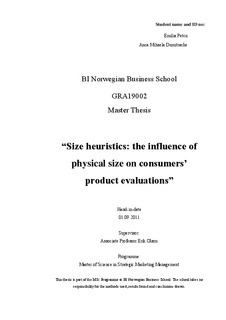| dc.description.abstract | Consumer behaviour has always been the focus of academic marketing research due to its significant managerial implications; even so, various aspects worth analyzing have been neglected. Size heuristics is one of the topics that did not receive sufficient attention so far. Apart from the theoretical contribution to the marketing filed, this topic has practical implications in the buying decision process as well as in the context of environmental concern. If size does influence the evaluation of a product, would it not lead to a contradiction with the general concern regarding a more sustainable consumption? By identifying this gap in the literature, the present study proposes that there is indeed a link between the size of a product and the perceptions that consumers form upon its quality, desirability and willingness to pay for it. Through a web – based survey using two product categories - apartments and cars - this study examines whether the preferences for larger or smaller stimuli leads to differences in evaluating a product. The analysis shows a positive association between the preference for large items and the impact on desirability. However, this association could not be established for the other two variables. The reasons behind a preference for larger items are also investigated. The authors propose three possible explanatory reasons: utilitarian, conspicuous and hedonic consumption. When the apartments category was investigated, utilitarian reasons were found to be a motivation for purchasing a larger version. On the other hand, conspicuous reasons were found to influence the preference for a larger version in the cars category. Hedonic consumption could not be explored due to the lack of reliable measurement scales. The findings of this study have both theoretical and practical implications and point out essential aspects worth to be further examined. Consequently, the present study will not only contribute to the consumer behaviour literature, but most importantly will enable managers to better understand the purchase behaviour of consumers in terms of emphasizing the preferred physical attributes. | no_NO |
